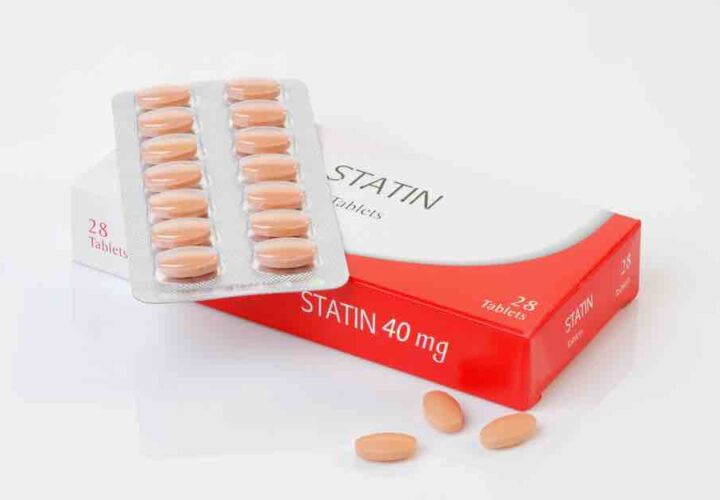We looked at all the credible, peer-reviewed studies out there, talked to experts. Here's everything you need to know about whether statins cause dementia.
Roughly a quarter of all Americans over the age of 40 in the U.S. take statin drugs — which lower levels of cholesterol — in order to prevent cardiovascular disease. But they might be receiving an unexpected benefit. Statins reduce the levels of so-called “bad” cholesterol in the body. In people with vascular health issues, this helps to prevent cholesterol build-up in vessels and arteries, which in turn benefits blood pressure, and helps prevent a stroke or a heart attack. But, these benefits are sometimes overshadowed by misinformation on the internet, according to Heather Ferris, a clinical endocrinologist and scientist at the University of Virginia who studies cholesterol metabolism and its relationship to Alzheimer’s.
A minority of researchers believe that statins which can cross into the brain — known also called “lipid-soluble” statins — may cause cognitive impairment or dementia (though these claims are seldom backed by evidence). This camp includes David Diamond, a professor of psychology at the University of South Florida.
“You’ll wonder, because now statins are so widely prescribed to a high percentage of older people and we have an epidemic of Alzheimer’s disease,” Diamond told Being Patient.
Ferris said that not only is there is no evidence to support the association between statins and increased instance of dementia — these claims and comments sometimes prompt or scare people to disregard their doctors’ advice and ditch their statins.
“These drugs really do save lives,” Ferris said. “I can’t tell you how much time we spend as physicians trying to get cardiac patients back on their statins because of the clickbait they read.”
Wait, what clickbait?
One of the top Google search results for “Do statins cause dementia?” — an un-bylined, 2021 article published in a glossy trade magazine for pharmacists — covers a study that supposedly found a scary link between statins and dementia. However, the discussion is of a conference presentation of unpublished research from a study that looks at associations between statins and dementia — not cause an effect. It’s one lone study, and it found that only certain types of statins are able to cross what’s called the blood-brain barrier, making their way from the bloodstream into the brain. There’s no proof of cause and effect here, and there have been many larger, peer-reviewed, published studies, that have found the opposite — not just no risk, but an actual protective effect. While this article might have great SEO to make its way into Google rankings, it’s not the final word on statins and dementia — far from it.
Below, we discuss multiple more credible studies and better, vast meta-analyses of scholar-backed research into the actual relationship between these common prescription cholesterol drugs and neurodegenerative diseases like, for example, Alzheimer’s.
Before we go further: What are statins?
Statins are designed to lower a person’s total cholesterol and reduce the risk of cardiovascular events like a heart attack or stroke. You might come across these generic drug names (and brand names):
- atorvastatin (Lipitor)
- fluvastatin (Lescol XL)
- lovastatin (Altoprev)
- pitavastatin (Livalo)
- pravastatin
- rosuvastatin (Crestor)
- simvastatin (Zocor).
Here’s how statins work, in super simple terms
Imagine your body is like a city with busy roads and highways. Now, think of cholesterol as cars moving along those roads. Cholesterol is a type of fat that your body needs, but sometimes there can be too much of it, like too many cars on the roads.
Now, statins are like traffic controllers for cholesterol. When there’s too much cholesterol, statins step in to regulate it. They work in your liver, which is like a big factory in our city, where cholesterol is produced. Statins help slow down the production of cholesterol in the liver, like telling the factory to make fewer cars.
“I can’t tell you how much time we
spend as physicians trying to get cardiac
patients back on their statins because
of the clickbait they read.”
–Dr. Heather Ferris, University of Virginia
Doctors prescribe statins when they see that there’s too much cholesterol in your bloodstream. High levels of cholesterol can lead to problems like clogged arteries, which are like traffic jams in our city roads. If there’s a traffic jam, it’s harder for things to move smoothly, and that can cause health issues, like heart attacks or strokes.
So, by taking statins, you’re helping to clear up the traffic jams in your body and keep things moving smoothly, giving your body a better chance to stay healthy and avoid problems caused by too much cholesterol. Statins are prescribed by doctors who carefully consider whether you need them based on your health.
Here’s the slightly more sophisticated explanation
Statins work by inhibiting an enzyme called HMG-CoA reductase, which plays a key role in the production of cholesterol in the liver. Here’s a more detailed breakdown:
The liver produces cholesterol for various functions, including the formation of cell membranes and hormones. HMG-CoA reductase is an enzyme in the liver cells that helps make cholesterol. When you take statin medications, they enter the bloodstream and make their way to the liver.
Inside the liver, statins specifically target and inhibit HMG-CoA reductase. Then, they reduce cholesterol synthesis: By blocking HMG-CoA reductase, statins slow down the production of cholesterol in the liver. Finally, then increase LDL receptor activity: LDL receptors help remove low-density lipoprotein (LDL) cholesterol from the bloodstream. Simultaneously, statins increase the activity of LDL receptors on the surface of liver cells.
That’s how statins lower cholesterol levels. With reduced cholesterol production and increased LDL receptor activity, there’s a decrease in the amount of LDL cholesterol circulating in the blood. And by regulating cholesterol synthesis and enhancing its removal from the bloodstream, statins help lower overall cholesterol levels.
This is key in managing conditions like high cholesterol, reducing the risk of cardiovascular diseases such as heart attacks and strokes.

Do statins have any kind of impact on the brain?
The relationship between statins and the brain is a topic of ongoing research, and findings have been mixed. While statins are primarily known for their cholesterol-lowering effects and cardiovascular benefits, some studies suggest potential connections with brain health, including possible protective effects and anti-inflammatory properties (which is key as inflammation is one possible driver of diseases like Alzheimer’s).
Possible neuro-protective effects
Some research suggests that statins may have neuroprotective effects, meaning they might help protect the brain from certain conditions. This has led to investigations into whether statins could play a role in preventing or managing neurodegenerative diseases, such as Alzheimer’s.
Anti-inflammatory properties
Statins have anti-inflammatory properties, and inflammation is implicated in various neurological conditions. This has sparked interest in exploring whether statins may have benefits in conditions where inflammation plays a role.
As with any medication, the decision to prescribe statins involves a careful consideration of potential benefits and risks, and individuals should discuss any concerns or experiences with cognitive effects with their healthcare providers.
Neurologist Gregory Jicha at the University of Kentucky explains the role of cholesterol in brain health.
“Cholesterol has long been linked to the development of dementia, so, as statins began to become used for lowering LDL and increasing HDL, there were observations that people on these medicines, in different populations of the world and across multiple countries, would have a lower risk of developing dementia,” Jicha told Being Patient in a Live Talk interview. “This is probably through those mechanisms that we talked about [earlier in the interview] — reducing amyloid plaques, reducing vascular disease, and the like. We’ve actually tested statins in multiple clinical trials, and we have yet to come up with convincing evidence. So, we’ve puzzled over this.”
Jicha sees two possible explanations for the difficulty of establishing this benefit super definitively in studies:
“One explanation is that when you’re put on a statin to lower your cholesterol to prevent stroke or a heart attack, we know that the benefit is not seen until several years out,” Jicha said. “You’ve got to be on [statins] for a significant period of time. When we do clinical trials, we typically do them for 12 to 18 months, and it may not be long enough of an exposure to statins to begin seeing the benefit. That’s one possible explanation.”
A second explanation for why the benefits of statins to the brain are still even being discussed as a question in the scientific landscape, as opposed to being considered proven, is that our understanding of cholesterol’s relationship to brain health is still not fully understood.
“A second possible explanation that’s been toyed with is that maybe it’s not the LDL or the HDL, maybe it may be more related to the triglycerides, and maybe we need to use different medicines,” Jicha said. “That’s a thought that came about, really, about 20 or 25 years ago, and several studies came out of Europe showing this benefit of being on cholesterol and triglyceride-lowering medicines. There are a few of those studies, a study in France and Italy, that actually looked at this and reported that the benefit may be much more related to the triglyceride effect of different medicines rather than the HDL or LDL component.”
Do statins have any risks or side effects?
Yes, like many medications, statins can have potential risks and side effects. It’s important to note that the majority of people who take statins do not experience serious side effects, and the benefits often outweigh the risks. However, it’s crucial to be aware of possible issues. Common side effects include:
- Muscle pain or weakness:
- Some people may experience muscle pain or weakness, known as myalgia. In rare cases, a more severe condition called rhabdomyolysis can occur, causing muscle breakdown.
- Liver enzyme abnormalities:
- Statins can sometimes lead to elevated liver enzyme levels. Periodic monitoring of liver function is typically recommended.
- Digestive issues:
- Gastrointestinal symptoms such as nausea, constipation, diarrhea, or abdominal pain can occur.
- Increased blood sugar levels:
- Some studies suggest that statins may slightly increase blood sugar levels, which could be a concern for individuals at risk of diabetes.
- Memory and cognitive issues:
- There have been reports of cognitive side effects associated with statin use, including memory loss or confusion. However, these effects are generally rare, and the overall evidence is not conclusive. Some studies suggest no significant negative impact on cognition, while others indicate potential associations. There are also a number of reasons that cognitive issues can appear, including some of the reasons statins might be prescribed in the first place. Talking to your doctor about your brain health concerns — or asking for a referral to a neurology specialist who understands the full scope of your health history and the reason why your doctor initially prescribed statins — is the best way to make sure you’re on the right course of medication.
Hang on, did you say ‘memory and cognitive issues’? Let’s take a closer look:
“Statins are a class of widely prescribed drugs used to reduce low-density lipoprotein cholesterol (LDL-C) and important to prevent cardiovascular diseases (CVD). Most statin users are older adults with CVD, who are also at high risk of cognitive decline,” write the authors of a 2022 study on statins’ relationship to cognition. “It has been suggested that statins can alter cognitive performance, although their positive or negative effects are still debated. With more than 200 million people on statin therapy worldwide, it is crucial to understand the reasons behind discrepancies in the results of these studies.”
The authors went on to review previous clinical research via the PubMed database, on the individual-related factors that could influence cognition, such as genetic factors, sex, ethnicity, age, and comorbidities, and the statin-related ones, i.e. lipophilicity, dosage, and the duration of treatment.
The team concluded, based on reviewing the PubMed trove of research, that collectively, the effect of statins on cognitive function and the incidence of Alzheimer’s varied widely depending on those individual-related factors, and somewhat unsurprisingly, age was the most influential. As for the statin-related factors, ultimately, the team said, more research is needed to draw any reliable conclusions.
“Statins can modulate cognitive function according to their inherent properties such as lipophilicity, dosage, and treatment duration,” the analysis authors wrote. “Yet, most of these independent studies are inconclusive. Taken together, in addition to the aforementioned individual-related factors, statin-related factors should be considered in future research concerning the effects of statins on AD and cognitive effects.”
So, what was this 2022 PubMed research review’s overall conclusion? “The precise mechanism of statin cognitive effects is still unclear,” the authors wrote. “As mentioned above, it has been shown that statins can have both cholesterol-dependent and –independent effects on cognition. […] Independent of cholesterol levels, statins have anti-inflammatory properties and can modulate the transcriptional activity of certain cerebral proteins with harmful effects on neurodegeneration.” In other words, statins anti-inflammatory powers can be a force of good in the fight of bad-news proteins in the brain, like the ones that show up in brains with Alzheimer’s.
In rare cases, the benefits of statin therapy may be outweighed by potential risks, and alternative treatments or adjustments to the dosage may be considered. As with any medication, individual responses can vary.
Do statins cause dementia or memory problems?
Concerns about statins out there because, frankly, the relationship between cholesterol and Alzheimer’s disease is downright strange: Research so far shows that high levels of cholesterol as well as abnormalities in cholesterol processing in the brain have links to Alzheimer’s. Meanwhile, some statins may be able to cross into the brain and disrupt its cholesterol metabolism.
Further complicating the discussion, this drug class is known to have occasional cognitive side effects: memory loss; confusion. However, research shows these effects don’t last: There is currently no established evidence that statins have any bearing on long-term cognitive function or dementia risk.
Some vocal opponents of statins have made the unfounded leap that because some statins cross into the brain, and because they may lead to cognitive issues in a small portion of the population, they can lead to dementia.
“These symptoms are immediate and reverse with stopping the medication,” Ferris told Being Patient.
There’s no evidence that statins cause
Alzheimer’s or dementia. In fact,
there’s research into whether they
might even help prevent it.
Ferris pointed to clinical trials of mild to -moderate Alzheimer’s: Taking statins daily had no impact on cognition for these patients. Meanwhile, one of the largest statins studies to date looked at a number of double-blind, controlled trials lasting longer than a year and found that statins didn’t have more cognitive side effects than the placebo group.
According to Ferris, patients are concerned about the yet-to-be-determined possibility that statins may be able to make their way into the brain (which may still not have any negative consequences, Ferris notes), they can switch to a less lipid-soluble statin — one with less ability to cross the blood-brain barrier — “but the frequency that this makes a difference is exceedingly rare,” Ferris said.
Could statins actually lower the risk of Alzheimer’s or dementia?
In one systematic review and meta-analysis of short- and long-term cognitive effects peer-reviewed and published in 2013, scientists did a search for studies that looked at the brain health of statin users and reviewed all the results to get to the bottom of the effect of statins on short-term cognitive function and the long-term incidence of dementia. Here’s what they found:
Of 16 studies the research team included in qualitative synthesis and 11 in quantitative synthesis, they saw some patterns. FIrstly, the short-term clinical trials didn’t reveal any kind of consistent effect of statin therapy on cognitive performance. But long-term cognition studies, on the other hand, included 23,443 patients with a mean statins exposure duration of somewhere between three to nearly 25 years. Three studies of those studies didn’t show any association between statin use and incident dementia — there was no consistent answer from these on whether there was any kind of increase or reduction in dementia risk. But the other five long-term clinical studies found a favorable effect. Altogether, the meta analysis showed there was a 29-percent reduction in incident dementia in patients who were users of statins over a long period.
“In patients without baseline cognitive dysfunction, short-term data are most compatible with no adverse effect of statins on cognition, and long-term data may support a beneficial role for statins in the prevention of dementia,” the study authors summed up.
Could declining to take prescribed statins increase your risk of Alzheimer’s disease or another form of dementia?
Stroke and heart issues
“Statins have been proven to be effective in minimizing the risk of cardiovascular adverse events,” write the authors of one 2023 meta-analysis on statins and blood pressure.
Strokes and heart issues, particularly those that affect blood vessels, can contribute to the development of vascular dementia. Vascular dementia occurs when there are problems with flow to the brain, often due to disorders like atherosclerosis (narrowing of the arteries) or small vessel disease — and like other forms of dementia, studies show lifestyle risk factors like diet and exercise appear to have a lot to do with your chances of developing vascular dementia.
What about blood pressure?
Statins primarily affect cholesterol levels and have only a modest impact on blood pressure. The main goal of statin therapy is to lower low-density lipoprotein (LDL) cholesterol and reduce the risk of cardiovascular events such as heart attacks and strokes. However, there are some indirect effects:
- Moderate hypertension reduction:
- The primary role of statins is in managing cholesterol levels, and they are not a first-line treatment for hypertension. That 2023 meta-analysis on statins and blood pressure found that while clinical studies did show a tiny benefit, it wasn’t statistically significant and more research is needed. The exact mechanism by which statins would help with hypertension is still unclear, but it’s thought to involve improvements in blood vessel function and decreased inflammation.
- Beneficial effects on arteries:
- Statins may help improve the health of blood vessels by reducing inflammation and promoting the production of nitric oxide. This might have a modest benefit, studies show.
- Combination therapy:
- Statins are often prescribed in conjunction with other medications specifically designed to lower blood pressure. This combination therapy is common for individuals with multiple risk factors for cardiovascular disease.
As we age, we experience an increased risk of developing hypertension — the leading risk factor for disease in the world. Dementia and cognitive decline are among the conditions for which hypertension increases the risk, and researchers are taking a closer look at this link.
Studies show that hypertension pressure can damage the delicate blood vessels that support the brain, hindering their ability to carry oxygen and nutrients to different regions of the brain. Over time, this impacts brain function and cognition, sometimes leading to dementia.
To get hypertension under control, clinicians prescribe medicines that tell blood vessels to relax or that prevent them from constricting. Treating high blood pressure, some clinicians noticed an unexpected benefit: cognitive decline seemed to be kept at bay in some patients taking blood pressure-lowering medications. But curiously, not all of the patients showed improvements.
This observation builds on a wealth of research investigating links between blood pressure and dementia. In one clinical study of 500 participants, scientists went in search of a deeper understanding of whether hypertension, even for patients in their 30s, could be a strong risk factor for dementia. They found that indeed, it was — Research shows pathological changes in the cardiovascular system may be driving as many as half of all cases of dementia.
Studies have also found that treating hypertension reduced the risk of cognitive impairment. Specific drugs that improve cardiovascular health, including statins and antihypertensives, were shown to reduce the risk of dementia by up to 21 percent.
The bottom line on whether statins cause dementia
There’s no evidence that statins cause Alzheimer’s or dementia. In fact, there’s research into whether they might even help prevent it. Not only are these “wonder drugs of cardiology” beneficial for cardiovascular health and cholesterol, and researchers are currently exploring whether they could also boost brain health. But there are a lot of variables to control for, Ferris pointed out.
“Epidemiological studies showed that people taking statins were less likely to develop Alzheimer’s disease,” she said. “But people on statins are accessing the health care system, so there are a lot of other potential factors that could be playing a role in this difference.”
While there are some studies that find statins may reduce the risk of developing Alzheimer’s by as much as 20 percent, there are many others that find no difference. A lot of these studies are observational and don’t account for any other confounding variables like race or socioeconomic status. Ferris also said that randomized-controlled trials where people either receive a placebo or a statin, have not convincingly shown a significant benefit for statins in preventing Alzheimer’s disease.
Nonetheless, studies are underway to determine whether certain statins have this extra benefit. In the meantime, Ferris and colleagues say, patients should skip the clickbait and stick with their prescribed statin regimen.
Learn more about these issues in our Brain Talk with neurologist Dr. Gregory Jicha, a neurology professor at the University of Kentucky:




Still difficult for me to decide to take statins or not as while it makes interesting reading there is nothing I could call conclusive
Hi Raymond, we understand deciding whether (or not) to take statins can be challenging. Research is ongoing, and while some studies suggest benefits, others highlight potential risks. Here’s a link to one of our Live Talks with Neurologist Gregory Jicha where he takes a more in-depth look at statins and the brain: https://www.beingpatient.com/gregory-jicha-statins-cholesterol-dementia-brain-health/?utm_source=organic&utm_medium=social – take care.